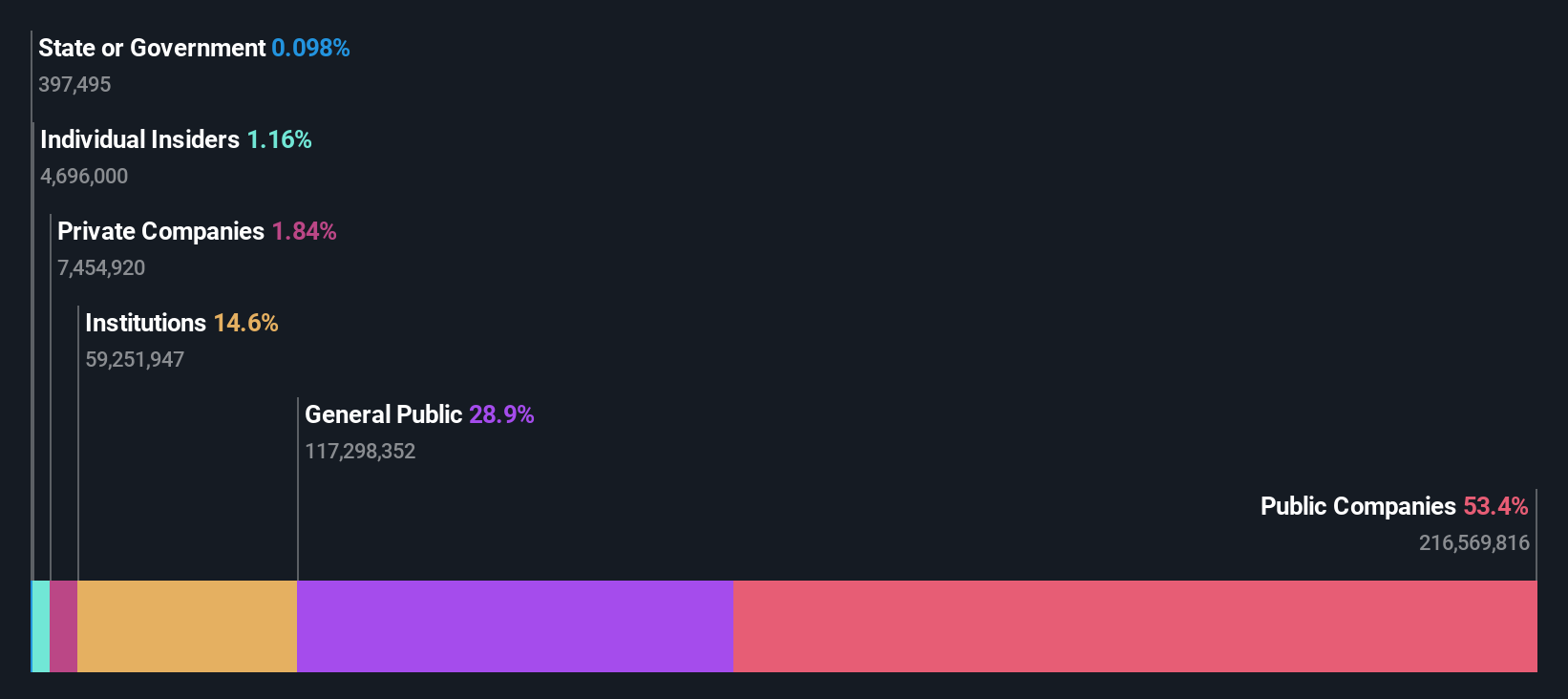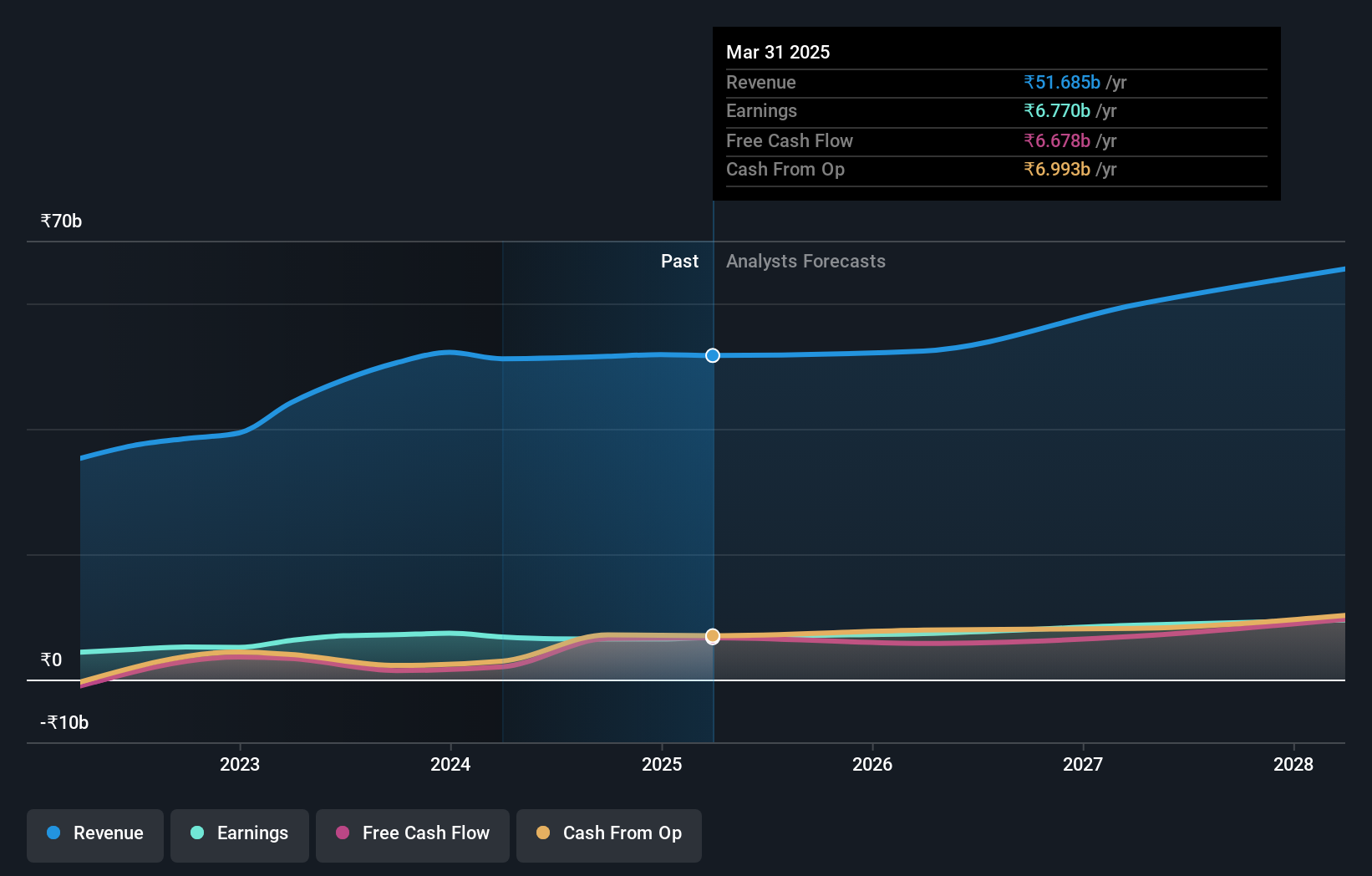Individual investors own 29% of Tata Technologies Limited (NSE:TATATECH) shares but public companies control 53% of the company
Key Insights
- Tata Technologies' significant public companies ownership suggests that the key decisions are influenced by shareholders from the larger public
- Tata Motors Limited owns 53% of the company
- Institutional ownership in Tata Technologies is 15%
Every investor in Tata Technologies Limited (NSE:TATATECH) should be aware of the most powerful shareholder groups. And the group that holds the biggest piece of the pie are public companies with 53% ownership. Put another way, the group faces the maximum upside potential (or downside risk).
And individual investors on the other hand have a 29% ownership in the company.
Let's delve deeper into each type of owner of Tata Technologies, beginning with the chart below.
See our latest analysis for Tata Technologies

What Does The Institutional Ownership Tell Us About Tata Technologies?
Institutional investors commonly compare their own returns to the returns of a commonly followed index. So they generally do consider buying larger companies that are included in the relevant benchmark index.
Tata Technologies already has institutions on the share registry. Indeed, they own a respectable stake in the company. This can indicate that the company has a certain degree of credibility in the investment community. However, it is best to be wary of relying on the supposed validation that comes with institutional investors. They too, get it wrong sometimes. When multiple institutions own a stock, there's always a risk that they are in a 'crowded trade'. When such a trade goes wrong, multiple parties may compete to sell stock fast. This risk is higher in a company without a history of growth. You can see Tata Technologies' historic earnings and revenue below, but keep in mind there's always more to the story.

Hedge funds don't have many shares in Tata Technologies. The company's largest shareholder is Tata Motors Limited, with ownership of 53%. This essentially means that they have extensive influence, if not outright control, over the future of the corporation. Alpha TC Holdings Pte. Ltd. is the second largest shareholder owning 4.3% of common stock, and TPG Capital, L.P. holds about 2.1% of the company stock.
Researching institutional ownership is a good way to gauge and filter a stock's expected performance. The same can be achieved by studying analyst sentiments. There are plenty of analysts covering the stock, so it might be worth seeing what they are forecasting, too.
Insider Ownership Of Tata Technologies
While the precise definition of an insider can be subjective, almost everyone considers board members to be insiders. The company management answer to the board and the latter should represent the interests of shareholders. Notably, sometimes top-level managers are on the board themselves.
Most consider insider ownership a positive because it can indicate the board is well aligned with other shareholders. However, on some occasions too much power is concentrated within this group.
Our most recent data indicates that insiders own some shares in Tata Technologies Limited. The insiders have a meaningful stake worth ₹3.4b. Most would see this as a real positive. If you would like to explore the question of insider alignment, you can click here to see if insiders have been buying or selling.
General Public Ownership
The general public-- including retail investors -- own 29% stake in the company, and hence can't easily be ignored. While this size of ownership may not be enough to sway a policy decision in their favour, they can still make a collective impact on company policies.
Public Company Ownership
It appears to us that public companies own 53% of Tata Technologies. This may be a strategic interest and the two companies may have related business interests. It could be that they have de-merged. This holding is probably worth investigating further.
Next Steps:
It's always worth thinking about the different groups who own shares in a company. But to understand Tata Technologies better, we need to consider many other factors.
I like to dive deeper into how a company has performed in the past. You can access this interactive graph of past earnings, revenue and cash flow, for free.
If you are like me, you may want to think about whether this company will grow or shrink. Luckily, you can check this free report showing analyst forecasts for its future.
NB: Figures in this article are calculated using data from the last twelve months, which refer to the 12-month period ending on the last date of the month the financial statement is dated. This may not be consistent with full year annual report figures.
Valuation is complex, but we're here to simplify it.
Discover if Tata Technologies might be undervalued or overvalued with our detailed analysis, featuring fair value estimates, potential risks, dividends, insider trades, and its financial condition.
Access Free AnalysisHave feedback on this article? Concerned about the content? Get in touch with us directly. Alternatively, email editorial-team (at) simplywallst.com.
This article by Simply Wall St is general in nature. We provide commentary based on historical data and analyst forecasts only using an unbiased methodology and our articles are not intended to be financial advice. It does not constitute a recommendation to buy or sell any stock, and does not take account of your objectives, or your financial situation. We aim to bring you long-term focused analysis driven by fundamental data. Note that our analysis may not factor in the latest price-sensitive company announcements or qualitative material. Simply Wall St has no position in any stocks mentioned.
About NSEI:TATATECH
Tata Technologies
Provides product engineering and digital services in India, the United Kingdom, North America, rest of Europe, and internationally.
Flawless balance sheet with moderate growth potential.
Similar Companies
Market Insights
Community Narratives




